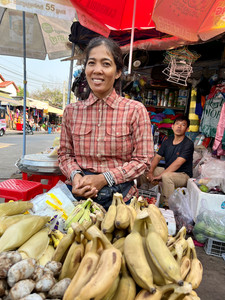Basis for life
- stiftungkanthaboph
- May 13, 2024
- 2 min read

Families provide their own food for their hospitalised children. There is no central hospital kitchen. Many locals therefore offer the food they have cooked or picked themselves in the streets near the hospitals.
Tuk-tuks rattle through the streets of Siem Reap, pedestrians make their way through the traffic, and you can buy anything your heart desires from the stalls lining the streets. Shirts and trousers, soft toys and dolls, nappies and water bottles - and a colourful variety of culinary delicacies.
Kam Sram has set up her basket of bananas, corn, and root vegetables in the street just behind the children's hospital and is waiting for customers. "The money I earn here is an important source of income for my family," explains the 40-year-old. She has been bringing her things here to sell for the past twelve years to earn a livelihood. Kam Sram explains with gratitude that all three of her children were born in the maternity unit at the hospital. "I am very happy that I received free help here."
Many of her current customers come from the hospital. They are both employees and family members of hospitalised children. Unlike in Switzerland, there are no kitchens in the hospitals. Food and care is provided exclusively by the mothers and fathers, grandparents and siblings who stay with the young patients around the clock. One child, one attendant - that's the rule. So there is always someone there to give information and dry tears.
After war and civil war, Cambodia has developed enormously in recent decades - also economically. Around three-quarters of the local population live in rural areas where, despite progress, poverty remains widespread. And in the cities, alongside a growing middle class, there are people living in slums with little access to clean water and sanitation. According to World Bank surveys, they make up around 40 per cent of the population in urban centres.
Ho Hak is also at the market to make ends meet for himself and his family. The 44-year-old shares a stall with his sister - he is there from 5am, she takes over from 10am. "Afterwards, I drive a tuk-tuk to earn some extra money." Small plastic containers are stacked on the table in front of him, offering vegetables and rice, soups and eggs, fish and sausages. They cook it all themselves, says Ho Hak. His pride and joy: "We raise chickens at home and sell the roasted meat here at the market."

Around 2,600 local employees and their families receive a livelihood thanks to fair wages from our foundation. At least as many people benefit from the sale of their products on the market - because every year, our hospitals admit more than 184,000 in-patients. In addition, there are almost 900,000 outpatient consultations. They all need to be treated and cared for. In this sense, the Kantha Bopha hospitals in Siem Reap and Phnom Penh not only save children's lives, they also keep a small economy going.








Comments